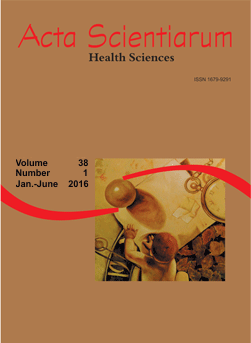<b>Frailty and geriatric syndromes in elderly assisted in primary health care
Resumo
The aim of this study was to describe the association between frailty and geriatric syndromes (GS) [cognitive impairment (CI); postural instability (PI); urinary/fecal incontinence (UFI); polypharmacy (PP); and immobility (IM)] and the frequency of these conditions in elderly people assisted in primary health care. Five hundred twenty-one elderly participants of The Multidimensional Study of the Elderly in the Family Health Strategy (EMI-SUS) were evaluated. Sociodemographic data, identification of frailty (Fried phenotype) and GS were collected. Multinomial logistic regression analysis was performed. The frequency of frailty was 21.5%, prefrailty 51.1% and robustness 27.4%. The frequency of CI was 54.7%, PP 41.2%, PI 36.5%, UFI 14% and IM 5.8%. The odds of frailty when compared to robustness and adjusted for gender, age, depression, self-perception of health, nutritional status, falls, vision and hearing, was significantly higher in elderly with CI, PI and PP. The adjusted odds of prefrail when compared to robustness was significantly higher only in elderly with CI. The most frequently presented number of GS (0-5) was two geriatric syndromes (26.87%). The frequency of frailty was high among elderly in primary health care and was associated with three of five GS (CI - PI - PP).
Downloads
DECLARAÇÃO DE ORIGINALIDADE E DIREITOS AUTORAIS
Declaro que o presente artigo é original, não tendo sido submetido à publicação em qualquer outro periódico nacional ou internacional, quer seja em parte ou em sua totalidade.
Os direitos autorais pertencem exclusivamente aos autores. Os direitos de licenciamento utilizados pelo periódico é a licença Creative Commons Attribution 4.0 (CC BY 4.0): são permitidos o acompartilhamento (cópia e distribuição do material em qualqer meio ou formato) e adaptação (remix, transformação e criação de material a partir do conteúdo assim licenciado para quaisquer fins, inclusive comerciais.
Recomenda-se a leitura desse link para maiores informações sobre o tema: fornecimento de créditos e referências de forma correta, entre outros detalhes cruciais para uso adequado do material licenciado.
























5.png)







